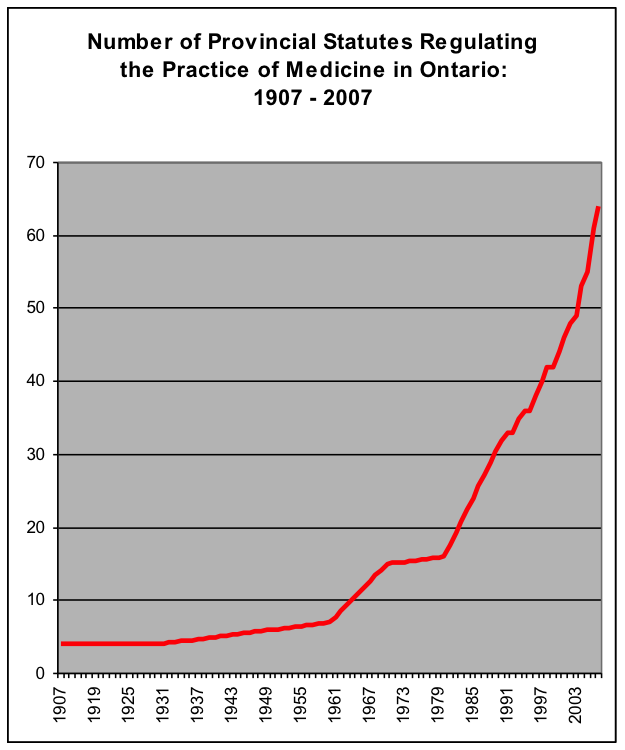 It seems there’s a bullying epidemic. Sometimes it hits you. You pick up your books, brush off your knees, and smear the tears from your eyes. Do you then:
It seems there’s a bullying epidemic. Sometimes it hits you. You pick up your books, brush off your knees, and smear the tears from your eyes. Do you then:
- Move on?
- Forgive and forget?
- Try to work it out?
Doctors in Canada are watching Ontario and Quebec closely. Quebec took command and control in Bill 20 with legislation against part time practice. Ontario reversed more than a decade of improvements possibly decimating primary care.
Edmund Burke cautioned that, “Those who don’t know history are destined to repeat it.” (pre-Santayana)
Legislation Epidemic?
 A lawyer friend added up all the statutes that regulate medical practice in Ontario, going back to 1907. Each statute can have many provisions. Statutes spawn even more regulations, but he ignored all these to make a simple point. He graphed his findings on the right.
A lawyer friend added up all the statutes that regulate medical practice in Ontario, going back to 1907. Each statute can have many provisions. Statutes spawn even more regulations, but he ignored all these to make a simple point. He graphed his findings on the right.
If this graph showed Ebola cases, we’d panic. Justice Winkler said bluntly that doctors and government “seemed to be on a collision course”. He said the current approach is not sustainable. Like swimming in a strong current, we don’t notice how far we’ve moved from shore, or the danger we’re in.
Everyone wants to be the boss but no one wants to take responsibility. The government wants to manage doctors but doesn’t want responsibility for outcomes. Politicians want to direct doctors like employees but don’t want the legal blame when their ‘employees’ under-perform.
How will physicians respond to the legislation epidemic?
Innovation, creativity and excellence in clinical care require freedom to act in the best interests of our patients. Legislation limits freedom. Certainly, some freedoms need restraint. But government has gone from limiting bad behavior to prescribing good with legislation. Well-meaning politicians trust that benevolent authorities can do more good than individual physicians. But, you cannot legislate innovation. Universal care loses benevolence in overregulation.
Doctors’ Response
Physicians are knowledge workers, not assembly line robots. You cannot manage doctors and patient care in the way you herd cattle or pick turnips. We cannot blame politicians for wanting action. If given the chance, doctors might whack with the blunt hoe of legislation too.
We must think deeply about this. Principles and logic never change opinions arrived at by emotion or ideology. Doctors’ heightened sense of fair play and natural aversion to political engagement hamstring the work ahead. Doctors will always find people who need their care, but will physicians be allowed to provide the care patients need? Doctors want desperately to partner with politicians finding solutions, but at what cost?
Doctors-and-patients know best what patients need, not politicians and bureaucrats. This firm moral resolve, and nothing less, underpins a great healthcare system. Only resolve promises relief from the legislation epidemic in Canadian healthcare.
photo credit: theguardian.com

3 thoughts on “Legislation Epidemic in Healthcare (1907-2007)”
Comments are closed.